Un silencio atronador (ante el genocidio palestino). A deafening silence (in front of the Palestinian genocide) ESP ENG
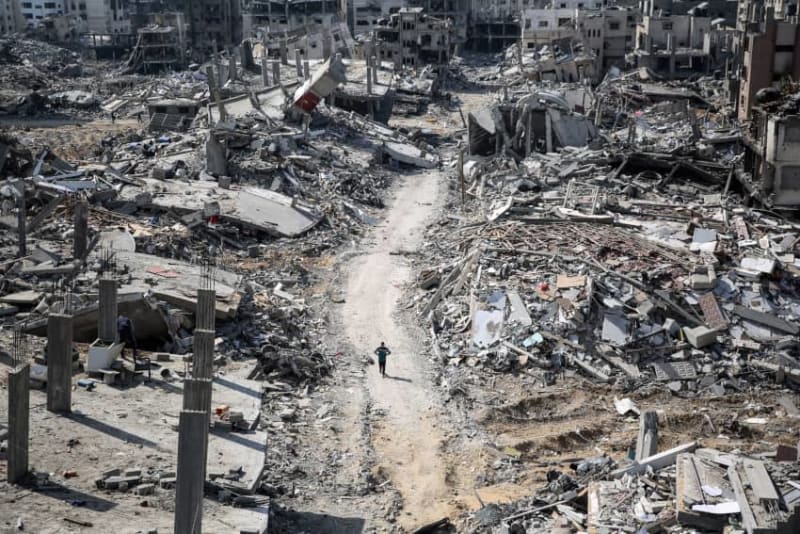
Nuestro silencio es cómplice. Our silence is complicit.
ESPAÑOL
UN SILENCIO ATRONADOR
La complicidad de nuestra equidistancia y supuesta "neutralidad"
Por Soledad Ascoeta Ortiz, de Health Workers For Palestine, Spain HW4PS
Cuando hace 18 meses comenzó el genocidio en Gaza, me paralicé. Deje todos mis proyectos en stand by, en espera. Apenas pude continuar con mi cotidiano, con aquellos compromisos ya adquiridos, con mi vida familiar tan preciada.
Jamás me había pasado algo así, un shock similar, por algún evento en el mundo. Pero a la vez, jamás habíamos presenciado y atestiguado, al menos en las últimas décadas, un genocidio en vivo, con sus imágenes crudas y diarias, en la cotidianidad de nuestro móvil. Filmados por ellas y ellos mismos, los palestinos nos muestran como, en un área de 360 km2 (ver), y a tan sólo unos pocos kilómetros de la llamada "civilización" y “democracia”, sus vidas, pero sobre todo la de sus niñas y niños, su futuro, es asesinado día a día bajo bombas emitidas por sus 'vecinos'. Y aunque tampoco sería justificativo, pero cabe recordar que no estamos hablando de un territorio remoto (ya pocos lo son), o con una geografía y un clima desfavorables (una costa preciosa, clima mediterráneo y llanura correspondiente), o acaso víctimas de una catástrofe imprevisible de la naturaleza...
Estamos hablando de un territorio en el que se han asesinado a más de 20 niñas y niños por día, de manera deliberada y atroz por Israel; de la mayor cantidad de niños amputados por cápita del mundo; de la aniquilación, sin precedentes, de todo el sistema sanitario, sin ningún tipo de consideración por la legislación internacional que prohíbe dicha destrucción; del mayor número de periodistas y trabajadores humanitarios asesinados durante un mismo conflicto y en el mismo periodo de tiempo que jamás se haya visto. Y todo esto convive con la distopia de gente que, en las mismas playas, a sólo 20 km de distancia, toma el sol con un refresco, tranquilamente. Y nosotros y nosotras, miramos, asépticamente.
Y si bien todos y todas deberíamos sentirnos horrorizadas, hay dos ámbitos, a los que pertenezco, que considero que deberían estar aún más implicados que nunca, y que lamentablemente no lo están.
El primero es el educativo, adónde me dirigí, inocentemente, buscando soporte y cómo colaborar, como habíamos hecho con guerras recientes como la de Ucrania. Pero aquí, las respuestas (salvo honradas excepciones), no sólo incluyeron la complicidad del silencio, sino también la infamia de la censura. Sin embargo, es desde aquí también desde donde surgieron espacios de búsqueda y de lucha, y en donde nos encontramos familias (mamás en la enorme mayoría de los casos) con el objetivo de que la paz y la solidaridad sean una verdadera asignatura en la escuela, pero encaradas justa y valientemente desde una perspectiva de verdadero antiracismo, justicia social, y defensa de los pueblos oprimidos. Y así surgió Famílies per la Pau, un colectivo desde donde nos acoplamos a la lucha por la libertad del pueblo palestino, entendida como justa e indispensable para nuestra propia libertad.
El segundo espacio constituye el sanitario. Los especialistas en bioética explican muy bien que, como colectivo profesional, nuestra ética colectiva implica la gestión de un valor de alta relevancia social como son la vida y la salud; y, por ende, tenemos un compromiso ético muy elevado en relación a dichos valores.
Y así como en el espacio educativo esperé que el común denominador que representa la infancia despertara un clamor de rechazo masivo al asesinato y la masacre cotidianos de niñas y niños, en el sanitario esperé, ingenuamente, que el ataque indiscriminado a la vida, y a la ayuda y a la atención humanitarias, generara un inmediato posicionamiento (de nuevo, como lo hicimos ante guerras muy recientes) de colegas, instituciones y organismos sanitarios.
Pero su silencio me horrorizó.
En el ámbito internacional, muy rápidamente comenzaron a aparecer colectivos de sanitarias por la causa Palestina. Sin embargo, si bien hubo honradas excepciones, no fue hasta hace unos meses que, poco a poco, sanitarias y sanitarios comenzaron a organizarse en diferentes puntos del Estado.
Y animadas por este movimiento interno y externo, con el objetivo de ampliar la lucha por los derechos humanos y contra el genocidio, y estimuladas por el contacto con colegas en el extranjero que promovían la idea de una lucha internacionalista, decidimos formar HW4P España, Sanitarias por Palestina España, con el objetivo de exigir a las instituciones sanitarias y gubernamentales el fin de las relaciones comerciales, diplomáticas, políticas y culturales con Israel y un cese al fuego inmediato y permanente; de promover el boicot de empresas israelíes ligadas al genocidio y el sistema de apartheid (especialmente hacia la farmacéutica TEVA, empresa directamente relacionada con el genocidio israelí); de fomentar la admisión y el traslado de pacientes y refugiados gazatíes a nuestro territorio; y de amplificar las voces y discursos de colegas sanitarias palestinas, así como la difusión de su lucha.
Después la detención y tortura por parte de Israel del Dr. Abu Safiyah, director del hospital Kamal Adwan en Gaza, junto a más de 200 colegas sanitarios, la Relatora especial de las Naciones Unidas para los Territorios Palestinos Ocupados, Francesca Albanese, instó a las sanitarias y sanitarios del mundo a "exigir la ruptura de todo tipo de lazos con Israel, como una manera concreta de denunciar, enérgicamente, la destrucción del sistema sanitario en Gaza por parte de Israel, como herramienta crítica del genocidio que están perpetrando".
Tras la ruptura unilateral del alto al fuego por parte de Israel, la situación se ha vuelto insostenible. Desde hace más de dos meses, y en contra de cualquier legislación democrática, universal y en favor de los derechos humanos, ha cesado absolutamente e ilegalmente la entrada de ayuda humanitaria a causa del bloqueo israelí. La población, un 40% de los cuales son niños, se asfixia en el medio de una hambruna creada por el hombre, sin acceso a agua potable, medicamentos ni suministros de ningún tipo, en la más absoluta ignominia, y ante las narices de un mundo que les gira la cara, voluntario, ante tal monstruosidad. En el medio de esta infamia, las bombas siguen cayendo, siguen enterrando niños que aún sonríen, como dice la canción de Lluís Llach, pero esta vez con su testamento en la mano.
Israel, sólo en las últimas semanas, ha atacado barcos con ayuda humanitaria en aguas internacionales; ha asesinado de manera dirigida a periodistas en su cama del hospital mientras se recuperaban; ha atacado a hospitales, deliberadamente, a un ritmo progresivo y marcado de impunidad; ha quemado vivas a niñas y niños en sus tiendas de refugiados…
La impunidad con la que transgrede cada día la legislación internacional el estado ocupante de Israel nos están sumergiendo en unas tinieblas de un mundo sombrío. Un mundo del que, si nos levantamos, será muy difícil recuperarnos.
Esperamos que la desidia, el clasismo, y finalmente la complicidad que han demostrado hasta ahora las organizaciones y organismos sanitarios no nos inmovilice, y os instamos a rechazar de manera activa este ataque deliberado a la vida, a la infancia, a las instituciones y personal sanitarios, así como a la ayuda humanitaria que este genocidio en curso ha normalizado.
Como dijo la periodista Olga Rodríguez hace unas semanas:
“Ángela Davis nos recuerda que ‘Palestina es realmente el centro del mundo. Es una prueba de fuego’. Palestina es el centro del mundo porque en el resultado de este genocidio en curso está en juego qué dinámicas se instalarán como ‘lógicas’ en nuestro futuro inmediato”.
Recuperemos la humanidad de nuestra ciencia y posicionémonos contra el genocidio, el apartheid y la ocupación.
Porque nuestra práctica es política. Porque nuestro silencio es cómplice.
NOTA. Texto publicado originalmente en la revista "Mujeres y Salud", nº 58, junio de 2025
ENGLISH
A DEAFENING SILENCE The complicity of our equidistance and supposed "neutrality"
By Soledad Ascoeta Ortiz, Health Workers for Palestine, Spain HW4PS
When the genocide in Gaza began 18 months ago, I froze.
I put all my projects on hold. I could barely continue with my daily life, with those commitments I'd already made, with my precious family life. I had never experienced anything like this, such a shock, due to any global event. But at the same time, we had never witnessed and witnessed, at least in recent decades, a genocide in person, with its raw, daily images, in the everyday life of our phones.
Filmed by themselves, the Palestinians show us how, in an area of 360 km2 (see), and just a few kilometers from so-called "civilization" and "democracy," their lives, but above all those of their children, their future, are being murdered day after day by bombs launched by their "neighbors."
And while this would not be justifiable, it's worth remembering that we are not talking about a remote territory (few are anymore), or one with unfavorable geography and climate (a beautiful coastline, Mediterranean climate, and corresponding plain), or perhaps victims of an unforeseeable natural disaster... We are talking about a territory where more than 20 children have been murdered every day, deliberately and atrociously by Israel; the highest number of children amputees per capita in the world; the unprecedented annihilation of the entire healthcare system, with no regard for the international law that prohibits such destruction; of the largest number of journalists and humanitarian workers killed during a single conflict and in the same period of time ever seen.
And all this coexists with the dystopia of people who, on the same beaches, just 20 km away, sunbathe with a soft drink, peacefully. And we, aseptically, watch. And while we should all be horrified, there are two areas, to which I belong, that I believe should be even more involved than ever, and which unfortunately are not.
The first is education, where I turned, innocently, seeking support and ways to collaborate, as we had done with recent wars like the one in Ukraine. But here, the responses (with honorable exceptions) included not only the complicity of silence, but also the infamy of censorship. However, it is also from here that spaces of search and struggle emerged, and where families (in the vast majority of cases, mothers) found ourselves with the goal of making peace and solidarity a real subject in school, but approached fairly and courageously from a perspective of true anti-racism, social justice, and defense of oppressed peoples.
And thus emerged Families for Peace, a collective from which we join the struggle for the freedom of the Palestinian people, understood as just and indispensable for our own freedom. The second space is the healthcare sector. Bioethicists explain very well that, as a professional group, our collective ethics entail the management of a value of high social relevance: life and health; and, therefore, we have a very high ethical commitment to these values.
And just as in the educational field, I hoped that the common denominator of childhood would spark a massive outcry of rejection of the daily murder and massacre of children, in the healthcare field, I naively hoped that the indiscriminate attack on life, and on humanitarian aid and care, would generate an immediate stance (again, as we did in the face of very recent wars) from colleagues, institutions, and healthcare organizations. But their silence horrified me.
On the international stage, healthcare workers' collectives for the Palestinian cause quickly began to emerge. However, while there were honorable exceptions, it wasn't until a few months ago that, little by little, healthcare workers began to organize in different parts of the country. Encouraged by this internal and external movement, with the aim of expanding the fight for human rights and against genocide, and stimulated by contact with colleagues abroad who promoted the idea of an internationalist struggle, we decided to form HW4P Spain, Sanitarias por Palestina España, with the aim of demanding that health and government institutions end commercial, diplomatic, political, and cultural relations with Israel and an immediate and permanent ceasefire; to promote the boycott of Israeli companies linked to genocide and the apartheid system (especially towards the pharmaceutical company TEVA, a company directly linked to the Israeli genocide); to promote the admission and transfer of Gazan patients and refugees to our territory; and to amplify the voices and discourse of Palestinian healthcare colleagues, as well as the dissemination of their struggle.
Following Israel's arrest and torture of Dr. Abu Safiyah, director of the Kamal Adwan Hospital in Gaza, along with more than 200 healthcare colleagues, the United Nations Special Rapporteur on the Occupied Palestinian Territories, Francesca Albanese, urged healthcare workers around the world to "demand the severing of all ties with Israel, as a concrete way of strongly denouncing Israel's destruction of the healthcare system in Gaza, as a critical tool of the genocide they are perpetrating."
Following Israel's unilateral breach of the ceasefire, the situation has become unsustainable. For more than two months, and contrary to any democratic, universal, or human rights legislation, the entry of humanitarian aid has been absolutely and illegally halted due to the Israeli blockade.
The population, 40% of whom are children, is suffocating in the midst of a man-made famine, without access to drinking water, medicine, or supplies of any kind, in the most absolute ignominy, and right under the nose of a world that voluntarily turns its back on them in the face of such monstrosity. In the midst of this infamy, the bombs continue to fall, burying children who still smile, as Lluís Llach's song says, but this time with their will in hand. In recent weeks alone, Israel has attacked ships carrying humanitarian aid in international waters; it has targeted the deaths of journalists in their hospital beds while they were recovering; it has deliberately attacked hospitals at a progressive pace marked by impunity; has burned girls and boys alive in their refugee tents…
The impunity with which the occupying state of Israel violates international law every day is plunging us into the darkness of a bleak world. A world from which, if we rise up, it will be very difficult to recover. We hope that the apathy, classism, and ultimately the complicity demonstrated so far by healthcare organizations and agencies will not paralyze us, and we urge you to actively reject this deliberate attack on life, on children, on healthcare institutions and personnel, as well as on the humanitarian aid that this ongoing genocide has normalized.
As journalist Olga Rodríguez said a few weeks ago: “Ángela Davis reminds us that ‘Palestine is truly the center of the world. It is a trial by fire.’ Palestine is the center of the world because the outcome of this ongoing genocide is at stake, as will the dynamics that will become ‘logical’ in our immediate future.”
Let's reclaim the humanity of our science and stand against genocide, apartheid, and occupation.
Because our practice is political. Because our silence is complicit.
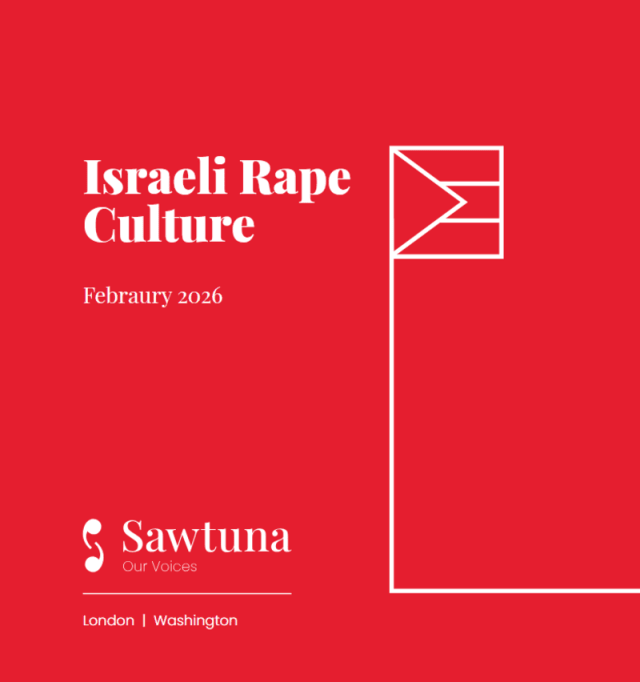
Israeli rape culture. Cultura israelí de la violación sexual. ENG ESP
Zionism is inherently imbued with rape culture. El sionismo como cultura de la violación
Publicado hoy.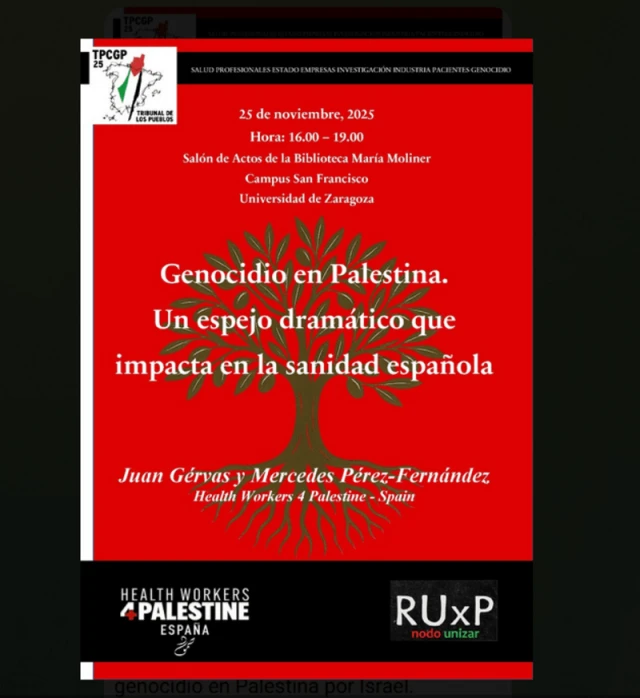
Vídeo. "Genocidio en Palestina. Un espejo dramático que impacta en la sanidad española" Vídeo 90 min
Encuentro en Zaragoza, preparación para el Tribunal de los Pueblos sobre la Complicidad con el Genocidio palestino en el Estado español TPCGP-25.
Publicado hace 2 días.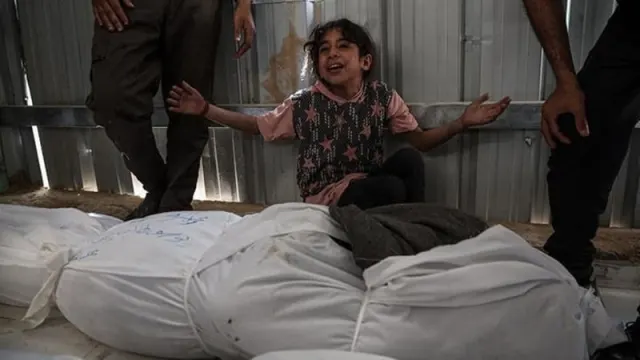
Gaza’s Orphan Crisis: 40,000. En Gaza, 40.000 huérfanos ENG ESP
40,000 children after losing one or both parents. 40.000 niños en Gaza sin uno o dos padres
Publicado hace 7 días.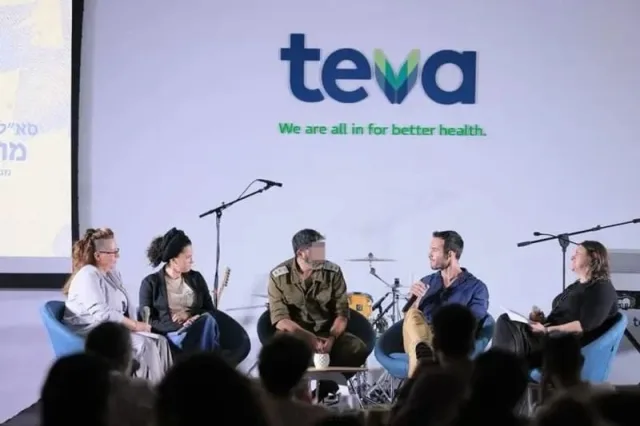
Teva y el ejército de Israel (IDF). Teva and the Israel Defense Forces (IDF). ESP ENG
Teva apoya directamente el genocidio palestino. Teva directly supports the genocide against Palestinians.
Publicado hace 14 días.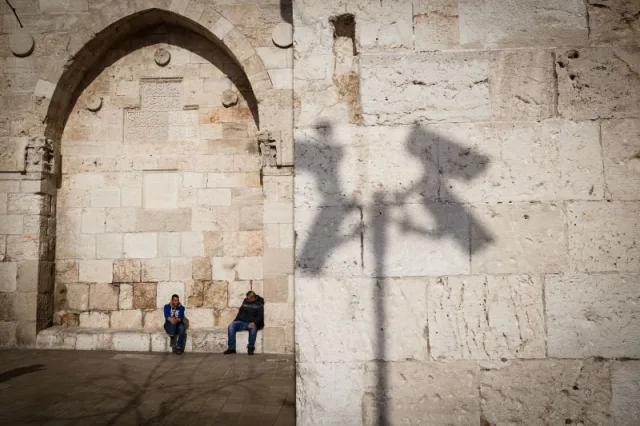
ICE operations (USA) versus Israel occupation of Gaza. EEUU, policía de inmigración versus Israel ocupación de Gaza. ENG ESP
“Imperial-colonial boomerang” in action. El «bumerán imperial-colonial» en acción
Publicado el 13 de febrero.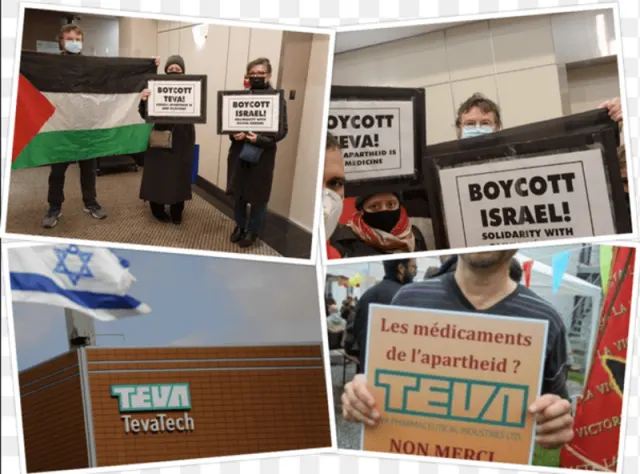
Teva, growing global backlash. Teva, boicot creciente ENG ESP
Teva: politics and business over compassion and ethics. Teva: política y negocio sobre compasión y ética
Publicado el 10 de febrero.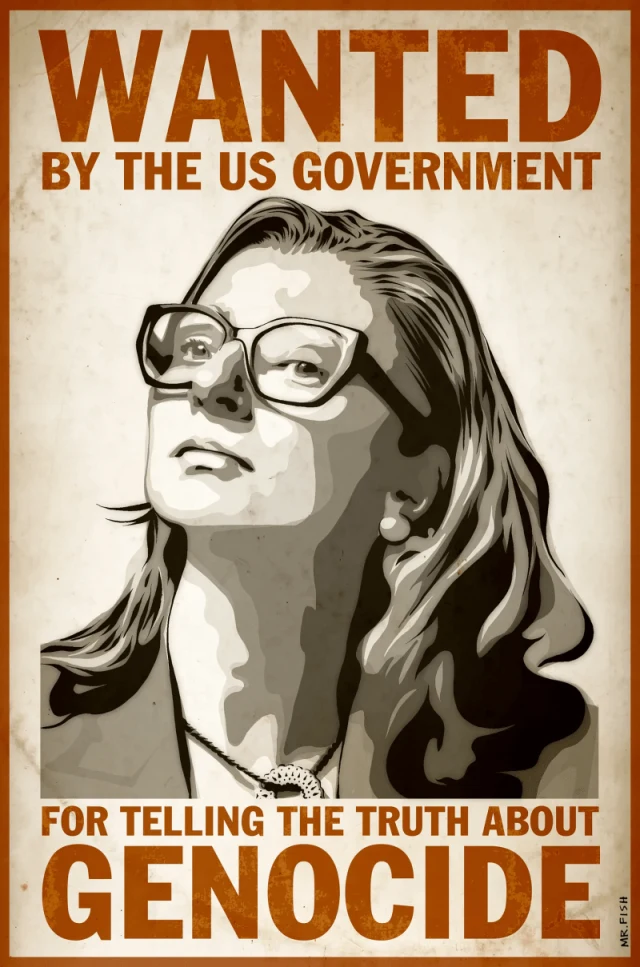
"Si Francesca Albanese es terrorista, yo también". "If Francesca Albanese is a terrorist, then so am I" ESP ENG
"Una relatora de derechos humanos de la ONU, tratadа como terrorista por documentar el genocidio en Gaza". "A UN human rights rapporteur, treated as a terrorist for documenting the genocide in Gaza"
Publicado el 9 de febrero.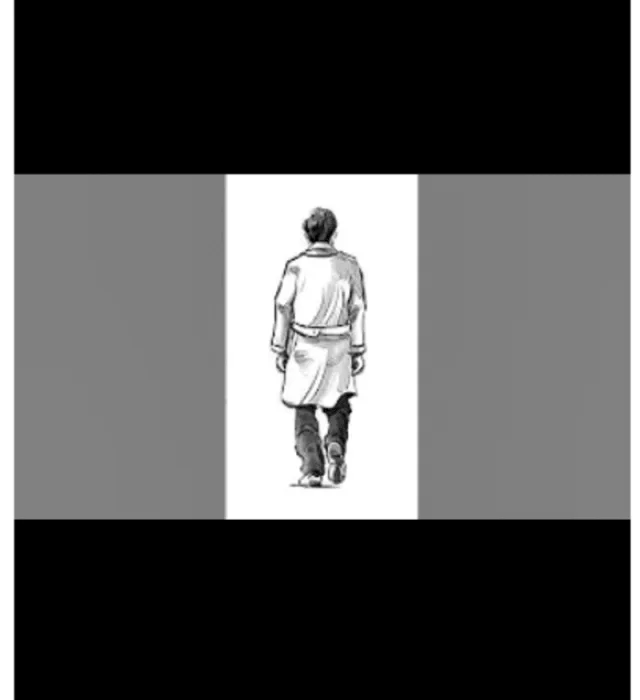
Vídeo, 60 sg. Dr. Hussam Abu Safiya. Lazos Rojos por la liberación de rehenes palestinos.
Campaña por la liberación de rehenes palestinos
Publicado el 7 de febrero.Ver más / See more


